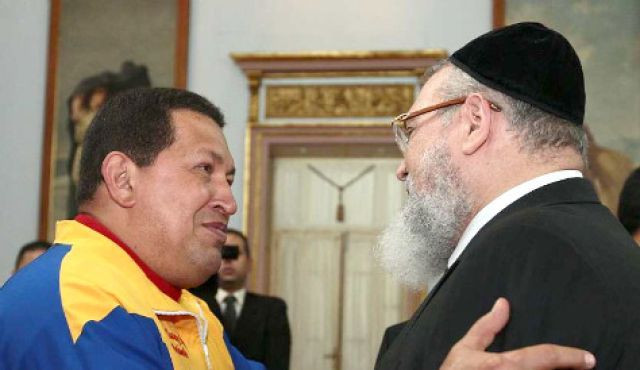
With about half of the Jewish population in Venezuela having left the country in the past decade, those celebrating Rosh Hashanah in Miami these days may be hearing a lot more Spanish than they might have before. Suburbs like North Miami Beach and Aventura have turned into little hubs for the Jewish Venezuelan diaspora, sponging up as many as 16,000 immigrants during the fourteen-year tenure of Hugo Chávez. On Thursday, the Associated Press described the Michael-Ann Russell Jewish Community Center in Miami, once populated mostly by the elderly, as being infused with young Venezuelans which, together with other Latinos, now make up some 85 percent of its membership.
The flight of so much of Venezuela's Jewish population had to do with many of the same reasons as that of the hundreds of thousands of members of the country's upper-middle class: spiking crime and inflation and an unfriendly climate toward private enterprise. But growing expression of anti-Semitism, punctuated by a few high-profile incidents, also provoked an exodus to traditionally Jewish areas in Miami. In one of those, a Caracas synagogue was ransacked in 2009, with religious objects smashed and walls vandalized with phrases like "Out with the Jews" and "Israel, the damned". 11 people were later arrested in connection with the incident, eight of whom turned out to be police officers.
Hugo Chávez repudiated the attack and met with Jewish leaders afterward to discuss their concerns over growing anti-Semitism in state media. Those leaders submitted to the then-president a dossier with numerous examples of anti-Semitism which they said appeared "almost daily, and for several years, in state media and government-friendly media." They also asked him to reestablish diplomatic relations with Israel, which was long a target of Chávez's thundering, perhaps most bluntly in June 2010 when a humanitarian aid float bound for Gaza was attacked by Israeli forces - "¡Maldito seas, Estado de Israel!" the Venezuelan president said then ("Damn you, state of Israel!"). Chávez was also a close ally of Iran, whose president Mahmoud Ahmadinejad notoriously denied that the Holocaust ever took place and has said that the state of Israel should be "wiped off the map".
Throughout his tenure, Chávez struck back at opposition members who accused him of being anti-Semitic, calling on "Jewish family" not to let themselves be manipulated. But Jewish groups within the country and outside of it said his anti-Israel rhetoric helped foment anti-Semitic sentiment. "Before Chávez came to power in Venezuela, anti-Semitic feeling was insignificant," charged the US-based Anti-Defamation League in 2010. "Current anti-Semitism in the aforementioned country is essentially a consequence of the government's declared hostility against the State of Israel."
Now, many Venezuelan Jews say they feel every bit at home in Miami as they did in Venezuela. Fanny Hausmann, whose family lives in Aventura, told the Associated Press, "We passed the tradition from there to here." She added that services at Sky Lake Synagogue are much like those she would've attended in Colombia, where she was born, while her husband - who is from Venezuela, where she also lived for several years - also felt at home. "When I go there, I feel like I would in Colombia," Hausmann said. "My husband feels like he's in Venezuela."
RELATED: Nicolas Maduro Verbal Gaffe: Venezuelan President Pushes For Schools To Multiply 'Just Like Christ Multiplied The Penises'
© 2025 Latin Times. All rights reserved. Do not reproduce without permission.




